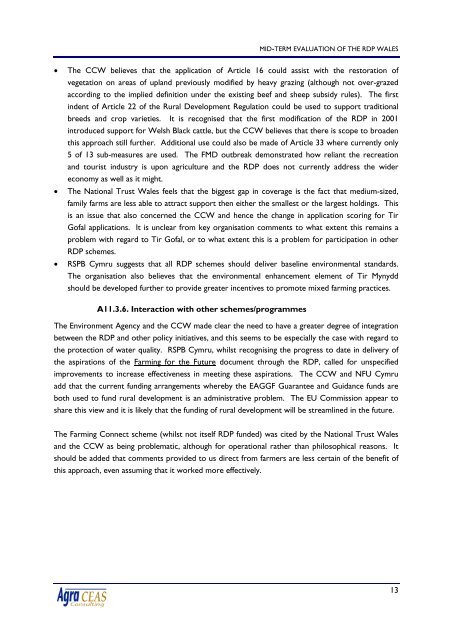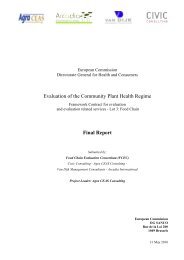A11 Views of interested organisations.pdf - Agra CEAS Consulting
A11 Views of interested organisations.pdf - Agra CEAS Consulting
A11 Views of interested organisations.pdf - Agra CEAS Consulting
You also want an ePaper? Increase the reach of your titles
YUMPU automatically turns print PDFs into web optimized ePapers that Google loves.
MID-TERM EVALUATION OF THE RDP WALES<br />
• The CCW believes that the application <strong>of</strong> Article 16 could assist with the restoration <strong>of</strong><br />
vegetation on areas <strong>of</strong> upland previously modified by heavy grazing (although not over-grazed<br />
according to the implied definition under the existing beef and sheep subsidy rules). The first<br />
indent <strong>of</strong> Article 22 <strong>of</strong> the Rural Development Regulation could be used to support traditional<br />
breeds and crop varieties. It is recognised that the first modification <strong>of</strong> the RDP in 2001<br />
introduced support for Welsh Black cattle, but the CCW believes that there is scope to broaden<br />
this approach still further. Additional use could also be made <strong>of</strong> Article 33 where currently only<br />
5 <strong>of</strong> 13 sub-measures are used. The FMD outbreak demonstrated how reliant the recreation<br />
and tourist industry is upon agriculture and the RDP does not currently address the wider<br />
economy as well as it might.<br />
• The National Trust Wales feels that the biggest gap in coverage is the fact that medium-sized,<br />
family farms are less able to attract support then either the smallest or the largest holdings. This<br />
is an issue that also concerned the CCW and hence the change in application scoring for Tir<br />
G<strong>of</strong>al applications. It is unclear from key organisation comments to what extent this remains a<br />
problem with regard to Tir G<strong>of</strong>al, or to what extent this is a problem for participation in other<br />
RDP schemes.<br />
• RSPB Cymru suggests that all RDP schemes should deliver baseline environmental standards.<br />
The organisation also believes that the environmental enhancement element <strong>of</strong> Tir Mynydd<br />
should be developed further to provide greater incentives to promote mixed farming practices.<br />
<strong>A11</strong>.3.6. Interaction with other schemes/programmes<br />
The Environment Agency and the CCW made clear the need to have a greater degree <strong>of</strong> integration<br />
between the RDP and other policy initiatives, and this seems to be especially the case with regard to<br />
the protection <strong>of</strong> water quality. RSPB Cymru, whilst recognising the progress to date in delivery <strong>of</strong><br />
the aspirations <strong>of</strong> the Farming for the Future document through the RDP, called for unspecified<br />
improvements to increase effectiveness in meeting these aspirations. The CCW and NFU Cymru<br />
add that the current funding arrangements whereby the EAGGF Guarantee and Guidance funds are<br />
both used to fund rural development is an administrative problem. The EU Commission appear to<br />
share this view and it is likely that the funding <strong>of</strong> rural development will be streamlined in the future.<br />
The Farming Connect scheme (whilst not itself RDP funded) was cited by the National Trust Wales<br />
and the CCW as being problematic, although for operational rather than philosophical reasons. It<br />
should be added that comments provided to us direct from farmers are less certain <strong>of</strong> the benefit <strong>of</strong><br />
this approach, even assuming that it worked more effectively.<br />
13













